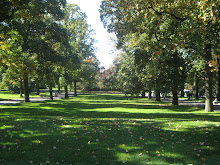
Mr. Renn's post over at the Urbanphile about authentic cities made me realize once again why I moved to fly over land. For those of you not in the know, this usually consists of the entire Midwestern region of the United States (From at least Ohio to Nebraska). A little less than 2 years ago I packed my bags and moved from NYC (the center of the world) to the Twin Cities. At that time most people didn't know where it was, nonetheless, ever heard of or had a geographic inkling about where the upper Midwest was. If they knew where Chicago was I was lucky.
What I love about living in Minneapolis, and working in St. Paul, is that I, and most residents, could care less about NYC, Chicago, and SF (all places I have lived). It really is ironic that in the Twin Cities region the next "big city" is Chicago (350 miles away), which Amtrak only goes to once a day from St. Paul. Here in the upper Midwest we live in the shadow of nobody. No NYC to Philadelphia, no Chicago to Milwaukee, we just seem to exist up here all by ourselves with no clear reflection from somebody else's shadow.
This brings me to Renn's post about looking at your history, past, heritage, and what you have as a way to identify yourself. From the post:
To renew our cities, we have to build on what they are, not what they aren’t. The lesson of Portland is not the physical things Portland did. The lesson of Portland is that they went their own way and did what was right for them. Other cities need to find their own paths. That doesn’t mean you can’t do something or aspire to be something you’ve never been. That’s how we grow as people and as cities. But suddenly deciding to just chuck your whole heritage, history, character, etc. and go in a radically different direction is probably not going to work. One reason, for example, the 1970’s era amateur sports strategy for Indianapolis worked is that sports was something that was already compatible with the local culture. It was a reworking of something that was already there, positioned for the future – and it fit the city.
People think we are crazy up here with our 6 months of freezing weather, long summer days, pick up trucks, lakes and rivers, thriving economy and culture, and overall pretty good quality of life. I think for the Midwestern cities to hit there stride again we might want to take Renn's advice and stop listening to the Richard Florida's of the world, who make a living pointing out what we are not, instead of what we are and can thrive to be.
I like it up here, and guess what, I am staying.




1 comment:
I love your conclusion and certainly agree with Renn's statements. The hard part perhaps is telling our stories. For many cities, heritage is a vague thing.
Have any ideas about how to keep that heritage close?
Post a Comment